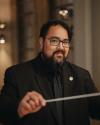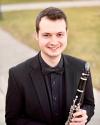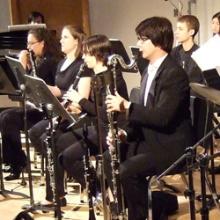Members of the UW Wind Ensemble (Timothy Salzman, director) perform music by Paul Dukas, Astor Piazzolla, Edward Elgar, Charles-François Gounod, Eugène Bozza, Felix Mendelsson, Anna Clyde, and others. With graduate student conductors David Stewart, Yuman Wu, and Solomon Encina.
Program
Fanfare pour précéder La Péri (1912) - Paul Abraham Dukas (1865-1935)
Brass choir
Histoire du Tango (1986) - Astor Piazzolla (1921-1992)
I. Bordel 1900
Clarinet choir
Nimrod from Enigma Variations (1898) - Edward Elgar (1857-1924)
Clarinet choir
Petite symphonie pour neuf instruments à vent (1885) - Charles-François Gounod (1818-1893)
I. Adagio - Allegretto
Solomon Encina, conductor
Andante et Scherzo (1938) - Eugène Bozza (1905-1991)
Saxophone quartet
Danny Boy (1910/1983) - Frederic Weatherly (1848-1929) Arr. James Olcott
Trumpet choir
Sonata VI for Cello and Continuo (1732) - Benedetto Marcello (1686-1739)
I. Andante
III. Grave
IV. Allegro
Tuba and String Bass duet
Mini Trio for Two Oboes and Cor Anglais - Allan Stephenson (1949-2021)
Oboe trio
Three Miniatures (1997) - David Uber (1921-2007)
Trombone quartet
Tiger Rag - Arr. Jack Gale (1936- 2022)
Trombone quartet
Notturno Op. 24 (1826) - Felix Mendelssohn (1809-1847)
Yuman Wu, conductor
Rhumba - Michael Coolen (b. 1946)
Flute choir
Florentiner March (1907) - Julius Fučik, (1872-1916) Arr. John T. Martin
Tuba-Euphonium Ensemble
Overflow (2020) - Anna Clyne (b. 1980)
David Stewart, conductor
Program Notes
In seventy years of life, Paul Abraham Dukas left behind only seven major compositions and five minor works. This was not because Dukas was a slow worker or lazy; he was one of the most self-critical composers in history, destroying or hiding many of his works which he felt to be unworthy. His last complete work was La Peri, a ballet commissioned in 1911 by Serge Diaghilev for the Ballets Russes. Upon completion of the work Dukas retired from composing and began a career as a composition teacher and served as a music critic. Among his students were Spanish composer Joaquin Rodrigo and French composer Olivier Messiaen.
Born in Argentina Astor Piazzolla grew up with the tango implanted in his soul. As a youthful composer, however, he abandoned his musical inheritance and began to write music inspired by early 20th-century European composers. As luck would have it, he moved to Paris to study with the fabled Nadia Boulanger, and she saved him from his misguided path. In his words, “When I met her, I showed her my kilos of symphonies and sonatas. She started to read them and came out with a horrible judgment. ‘It’s very well written,’ she said, ‘but here you are like Stravinsky, here like Bartók, here like Ravel — but I cannot find Piazzolla.’ After I confessed to her that I was a cabaret tango musician, she asked me to play on the piano some bars of a tango of my own. She suddenly opened her eyes, took my hand and told me, ‘You idiot, that’s Piazzolla!’ And I took all the music I composed, ten years of my life, and sent it to hell in two seconds.” He took Boulanger’s advice to heart and it became his passion to bring the tango, which began as a seductive partner dance in the brothels and dance halls of Argentina, to the world’s concert halls. In 1985, he wrote The History of the Tango to capture its evolution during the 100 years since its beginning. To accompany the music, he left a program note for each of the four movements: Bordell, 1900: “The tango originated in Buenos Aires in 1882. It was first played on the guitar and flute. Arrangements then came to include the piano, and later, the concertina. This music is full of grace and liveliness. It paints a picture of the good-natured chatter of the French, Italian, and Spanish women who peopled those bordellos as they teased the policemen, thieves, sailors, and riffraff who came to see them. This is a high-spirited tango.”
Nimrod is the name given to the ninth and best-known variation in the Enigma Variations, an orchestral work of 14 variations each designed to be a portrait of one of 14 members of Edward Elgar's family and circle of friends. A celebrated work, Nimrod is a portrait of Augustus J. Jaeger, Elgar's editor and publisher. This serene variation portrays a story, rather than personifies Jaeger, representing the years of advice and encouragement given to Elgar by his friend. Supporting Elgar throughout depressive episodes and lack of confidence in his work, Jaeger once reminded him of Beethoven's music, which only increased in beauty, despite the composer's similar anxieties. In tribute to this moment, Nimrod's opening evokes a subtle hint of the second moment theme from Beethoven's Piano Sonata No. 8 'Pathétique', which Jaeger had sung to him for inspiration.
Charles-François Gounod was originally commissioned to write a chamber work for winds by his friend Paul Taffanel, flute professor at the Paris Conservatoire. Gounod structured the instrumentation of Petite symphonie pour neuf instruments à vent to mirror that of classical Mozart wind octets: two oboes, two clarinets, two bassoons and two horns. Gounod also included a singular flute part in honor of Taffanel. The entire work is a four-movement structure, continuing the homage to classical-era wind serenades, the first movement an Adagio introduction followed by an Allegretto in sonata form.
Andante et Scherzo for saxophone quartet was written for Marcel Mule’s quartet. The music clearly follows the Impressionist spirit of French music at the turn of the century. The Andante flows in gently rocking colours, the Scherzo swirls away in lively fashion; it is carefree performance music in the best sense of the word – entirely in the spirit of those representatives of Eugène Bozza’s own generation in France (from Poulenc to Françaix) who continued to avail themselves particularly consistently of tonal means.
Danny Boy is a traditional folk song with lyrics originally written in 1910 by an English Lawyer, Frederic Weatherly, and set to the Irish melody of “Londonderry Air” in 1913. It became one of the most popular songs of the early 20th century, and many interpret the lyrics to be sung by a parent whose child is going off to war. In 1983, James Olcott adapted the melody to trumpet sextet, featuring two piccolo trumpets carrying the tune’s soaring melodies (for added intonation challenge of course, thanks James). We will not be singing the lyrics because we will be occupied with our trumpets, but feel free to sing along to the cheery tune!
Oh, Danny boy, the pipes, the pipes are calling
From glen to glen, and down the mountain side.
The summer's gone, and all the roses falling,
It's you, it's you must go and I must bide.
But come ye back when summer's in the meadow,
Or when the valley's hushed and white with snow,
It's I'll be there in sunshine or in shadow,—
Oh, Danny boy, Oh Danny boy, I love you so!
But when ye come, and all the flowers are dying,
If I am dead, as dead I well may be,
Ye'll come and find the place where I am lying,
And kneel and say an Avé there for me.
And I shall hear, though soft you tread above me,
And all my grave will warmer, sweeter be,
For you will bend and tell me that you love me,
And I shall sleep in peace until you come to me!
Benedetto Marcello’s Six Sonatas for Cello and Continuo surfaced late in his career, after he was well established as a composer of religious works and concerti. These short pieces for solo cello translate well to many other instruments and will be performed today down an octave from written pitch to showcase the low registers of the tuba and bass.
Allan Stephenson was a British-born composer who lived out most of his musical career in South Africa, after he left his native country at age 24 to join the Cape Town Symphony Orchestra as principal cellist. Stephenson grew to be a very successful composer in South Africa following his years of work there, with one of his most well-known pieces being an act from the Mandala Trilogy, an opera documenting Nelson Mandela's life. Throughout his life Stephenson wrote over 110 works including operas, symphonies, concertos, and chamber music that continue to be enjoyed today.
Felix Mendelssohn composed Notturno Op. 24, when he was just 17. Scored for flute, oboes, clarinets, horns, bassoons, contrabassoon, and trumpet, the work highlights Mendelssohn’s skill in blending lyrical beauty with rich textures and dynamic contrasts. While the title suggests a calm, nocturnal atmosphere, the piece balances serene, reflective passages with lively, energetic moments, showcasing both delicacy and boldness. It remains a beloved work in the wind ensemble repertoire for its charm and rhythmic vitality.
Michael Coolen, Professor of Ethnomusicology and Music, has been the recipient of the five Fulbright Fellowships, four NEH Summer Seminar Fellowships, Oregon State University College of Liberal Arts Teacher of the Year, and many other awards and honors. He has lived, worked, and taught in Africa, Europe, and New Zealand. In addition to coordinating theory and composition studies at Oregon State University, he is also Director of the Sound Design Studio and Recording Studio. His interest in world music and cultures is reflected in many of his compositions. Among them are numerous African and Latin-American arrangements and compositions he has written for piano, woodwind, and brass ensembles, marimba ensembles, steel drum ensembles, and vocal choirs. The Rhumba (pronounced here “roombah”) is designed to encourage eye contact and interaction between performers and audience members.
Often referred to as an "Italian Grand March," Florentiner is often referred to as Julius Fučik's most popular work, superseding his well-known "Entrance of the Gladiators." Fučik was a prominent figure in promoting legitimate and deemable "worthwhile" wind band repertoire through his involvement as bandmaster of the Austro-Hungarian Army's 86th Infantry Regiment. 'Florentiner' itself contains numerous themes and lilting figures, often referred to as the effort of thematic works in an operetta. Playful interjections can be heard between militaristic and even serious thematic sections. The work is perceived as highly playful, lighthearted, spiteful, and even highly sarcastic.
Overflow is a wind dectet inspired by Emily Dickinson’s poem, By The Sea, in which we experience the ocean’s power over the poet’s imagination - both alluring, unsettling and dangerous. The line from which this piece takes its title “Would overflow with Pearl” reminded me of an image from Jelaluddin Rumi’s poem Where Everything is Music whereby the tiniest motion of a pearl on the ocean floor can cause great waves above. The opening sonority of Overflow also draws inspiration from Rumi’s words of a “slow and powerful root that we can’t see” with a low B-flat, the lowest pitch of the ensemble emerging from silence.
UNIVERSITY OF WASHINGTON WIND ENSEMBLEFLUTE OBOE BASSOON CLARINET BASS CLARINET SAXOPHONE TRUMPET Erika Berreth, So., Computer Science, Redmond HORN Kiyoshi Colon, Alumni., Chemistry, Everett TROMBONE EUPHONIUM TUBA BASS PERCUSSION PIANO DOCTORAL STUDENT CONDUCTORS *principal |
Biographies

University of Washington Professor Emeritus Timothy Salzman served as Professor of Music/Director of Concert Bands and conductor of the UW Wind Ensemble from 1987 to 2025. When he was appointed to the position there were 11 students enrolled in one UW wind band – in his final year there were 335 enrolled in five bands. Former graduate wind conducting students of Professor Salzman have obtained positions at 74 universities and colleges throughout the United States and include past presidents of the American Bandmasters Association and the College Band Directors National Association as well as Jiannan Cheng, Assistant Conductor of the Baltimore Symphony Orchestra. During his tenure at the UW the band program was involved in commissioning and, in certain cases, the premiering of 38 new works for wind ensemble and undertook many concert tours including seven to Asia. From 1978 to 1983 he was band director in the Herscher, Illinois, public school system where the band program received numerous state, regional and national awards in solo/ensemble, concert and marching band competition. Immediately prior to his UW appointment he served for four years as Director of Bands at Montana State University where he founded the MSU Wind Ensemble and ‘Spirit of the West’ Marching Band. Professor Salzman holds degrees from Wheaton (IL) College, and Northern Illinois University, and studied privately with world-renown wind instrument pedagogue Arnold Jacobs, former tubist of the Chicago Symphony Orchestra. He has numerous publications for bands with the C. L. Barnhouse, Arranger's Publications, Columbia Pictures, Hal Leonard Publishing and Nihon Pals publishing companies, and has served on the staff of new music reviews for The Instrumentalist magazine. Professor Salzman has been a conductor, adjudicator, arranger, or consultant for bands throughout the United States and in Canada, England, France, Russia, South Korea, Indonesia, Thailand, Singapore, the Philippines, China, and Japan, a country he has visited twenty-one times. He has traveled to China twelve times where he served as visiting professor at the China Conservatory, given master classes for numerous wind bands, and conducted several ensembles including the Shanghai Wind Orchestra, the People's Liberation Army Band, the Beijing Wind Orchestra, The China Conservatory Wind Ensemble and the Tsinghua University Band in multiple concerts. He also served on three occasions as an adjudicator for the Singapore Youth Festival National Concert Band Championships. He has conducted several of the major military bands in the United States including a 2019 world premiere with 'The President's Own' United States Marine Band. He was compiling editor and co-author (with several current and former UW graduate students) of A Composer's Insight: Thoughts, Analysis and Commentary on Contemporary Masterpieces for Wind Band, a five-volume series of books on contemporary wind band composers. The forwards to each volume were written by five Pulitzer Prize-winning composers. He was also a contributing author to a recent book (2022) about his former teacher entitled Arnold Jacobs: His Artistic and Pedagogical Legacies in the 21st Century. Professor Salzman is an elected member of the American Bandmasters Association and is a past president of the Northwest Division of the College Band Directors National Association. He is an elected member of the Drum Corps International Hall of Fame as well as the Santa Clara (CA) Vanguard and Cavaliers (IL) Drum and Bugle Corps Hall(s) of Fame for his work as an arranger and brass instructor. In 2009 Nihon Pals, a music education resource company based in Osaka, Japan, released a set of instructional DVDs regarding ensemble musicality featuring the UW Wind Ensemble. The University of Washington hosted the 2011 National Conference of the College Band Directors National Association.

Solomon Encina is a Graduate Assistant at the University of Washington, where he is pursuing a Doctor of Musical Arts (D.M.A.) in Instrumental Conducting. Solomon holds a Bachelors of Music degree in Instrumental Performance in Percussion from California Baptist University. He also holds a Masters in Music Education degree from Azusa Pacific University where he studied under Dr. Alexander Koops and Dr. John Burdett.
Solomon is a native of the Southern California region, where he has taught and arranged music for several high quality institutions. Most recently, he served as the Director of Bands at Los Osos High School in Rancho Cucamonga, CA, where the band, orchestra and color guard program regularly received high distinction awards at festivals throughout the state under his direction. During this time he also performed as a percussionist with several touring groups throughout the United States and as a guest conductor of the European Tour for Southern California Ambassadors of Music. After several years as a high school educator, Solomon is thrilled to begin pursuing his highest academic aspirations by attending UW to study under Professor Timothy Salzman.
Solomon Encina has affiliations with the National Association for Music Education (NAfME), the College Band Directors National Association (CBDNA), the California Music Educators Association (CMEA), and the Southern California School Band and Orchestra Association (SCSBOA). Solomon Encina is proudly endorsed by the Vic Firth Company and is a part of the Vic Firth Education team.

David Stewart is a Graduate Assistant at the University of Washington, where he is pursuing a Doctor of Musical Arts (D.M.A.) in conducting. David holds degrees in music performance and music education from Central Washington University and received a Master of Music from the University of Montana. A native of the Pacific Northwest, he attended Mercer Island High School and spent his weekends playing in the Seattle Youth Symphony Orchestra. His early experiences working with influential music educators shaped his ambition to become a band director himself. After realizing this dream and teaching at Graham-Kapowsin High School for four years, he decided to further his education and focus on conducting. As a performer, David has achieved notable success. He won his university's concerto competition as a freshman and received the National Band Association's Outstanding Musician Award. In 2018, he was featured as a soloist at the Western/Northwestern CBDNA Conference, where he delivered a standing-ovation performance of Scott McAllister's "Black Dog" for solo clarinet and wind ensemble.
Most evenings and Saturdays, you'll find David working with the Husky Marching Band, where he not only conducts but also plays a role in crafting the band’s dynamic game-day performances. He embraces the vibrant culture, community, and traditions of the Husky Marching Band and works to create memorable experiences for both participants and audiences. Beyond his musical pursuits, David enjoys mountain biking, rock climbing, and chess. He is also a trained mindfulness teacher, reflecting his well-rounded approach to music and life.

Yuman Wu is a Graduate Assistant at the University of Washington, where she is pursuing a Doctor of Musical Arts (D.M.A.) in Instrumental Conducting under the mentorship of Timothy Salzman and Erin Bodnar. At UW, she serves as the conductor for UW Concert Band, assistant conductor for the UW Wind Ensemble and Symphonic Band, and contributes to the Husky Marching Band. She also assists in teaching the undergraduate conducting classes, working closely with music education majors. As a conductor, multi-instrumentalist, and educator, Yuman enjoys playing music from all cultural backgrounds, innovating new ideas, and leading the music industry forward with inclusivity. She was recently selected as one of five conductors for the prestigious 2025 U.S. Army Band Conductors Workshop, where she conducted The U.S. Army Band “Pershing’s Own” in a public performance at the Rachel M. Schlesinger Concert Hall in Washington, D.C.
Yuman holds a Master of Music in Wind Conducting from the Peabody Institute of Johns Hopkins University, where she studied with Dr. Harlan Parker and served as Teaching Assistant for Secondary Instrumental Conducting. She also earned a Master of Science in Business Analytics from Cornell University. Yuman completed three Bachelor's degrees in Music, Statistics, and Economics from the University of Illinois at Urbana-Champaign.
Yuman has a strong interest in marching bands, the fusion of Asian and Western music, the integration of technology and music, and helping more people learn and appreciate music. Yuman also embraces cultural diversity, leading and establishing an ensemble that fuses Asian and Western music during her academic years. She has frequently performed and showcased this ensemble at consulate events. Additionally, as a Teaching Assistant with the Student Disability Service during her Master program, she assists visually impaired students by translating musical scores and providing necessary support in their study and daily lives.
